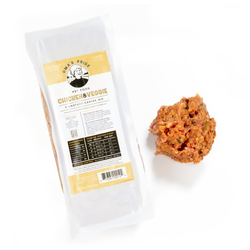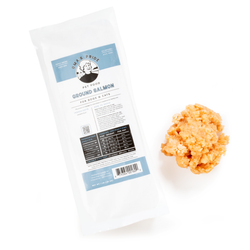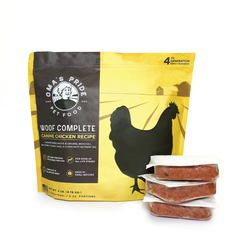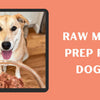How to Naturally Help Your Dog’s Upset Stomach (9 Tips)
Are you a dog owner in a rural location, prefer holistic remedies, or simply like to be prepared?
No matter the reason, knowing how to help your pup’s stomach issues is good.
While you can't treat all upset stomachs at home, you might be surprised that some everyday items can help your dog recover.
If you’re looking for what to give your dog for an upset stomach using home remedies, you’ve come to the right place. You can use strategies like fasting your dog, keeping them hydrated, feeding a bland diet, giving fibrous foods, introducing electrolytes and probiotics, or using herbs.
Read on to learn the causes of canine tummy issues, when you should visit the vet, and methods to help prevent problems in the future.
Common causes of a dog's upset stomach

While most acute stomach issues in dogs are not very concerning, some are.
It's always good to err on the side of caution regarding your dog's health. If you're concerned that something is just not right, visit your local vet, vet hospital, or holistic vet.
Very common causes
- Eating something they shouldn’t. This is, by far, the most common reason why dogs end up with an upset stomach. Consider whether your dog has eaten a plant (indoors or outdoors), food dropped on the ground (like a grape), or has recently been exposed to another toxin or poison.
- Food allergies or medication reactions. Some dogs (like my own, Finley) have numerous food allergies or medication reactions. If you notice your pup getting sick right after eating certain foods or taking meds, consider getting them allergy tested to identify the allergens.
- Intestinal parasites. Unfortunately, dogs and puppies get parasites frequently after eating contaminated food, drinking contaminated water, or licking contaminated surfaces. If your dog has been to a public park, doggy daycare, or played with another infected dog, consider getting a fecal test to check for parasites.
- Changing food suddenly. Some dogs have sensitive systems that can’t handle abrupt changes. For example, switching from a kibble diet to a raw diet in one meal might make some dogs experience diarrhea or loose stools. If you’ve abruptly changed your dog’s diet recently, it could be causing stomach issues.
- Acute pancreatitis. If your dog eats a lot of fat quickly, they could develop pancreatitis. When this happens, your dog’s liver and pancreas become inflamed. Pancreatitis is serious, so if you are concerned, please see a vet immediately.
- Motion sickness or vestibular episodes. Motion sickness, balance issues, and vestibular disease are common in dogs. If your dog gets sick in the car, often loses their balance, falls randomly, or tilts their head, they could be dizzy with balance issues.
Less common causes
- Stomach ulcer. The presence of stomach ulcers can cause an upset stomach. However, you’ll also see more severe symptoms than stomach aches or diarrhea. You might also notice blood in vomit, black tarry stools, hypersalivation, weight loss, and more.
- IBS (Irritable Bowel Syndrome). Diagnosed IBS in dogs is rare. However, many dogs can experience IBS-adjacent symptoms like diarrhea and constipation frequently.
- Cancers. Cancer can cause an upset stomach. However, you will probably see other severe warning signs like anorexia, weight loss, constant vomiting, and more if cancer is causing an upset stomach.
9 home remedies for a dog's upset stomach
The most effective way to settle your dog’s upset stomach is to identify the cause first, then match this with a solution.
Below you’ll find detailed solutions to get your pup on the path to recovery:
- Keep your dog hydrated
- Fast your dog
- Give them a bland diet
- Feed fiber-rich foods to support digestion
- Introduce electrolytes
- Try using herbs
- Support the gut with probiotics
- Use natural dewormers (parasites)
- Consider approved over-the-counter medications

1. Keep your dog hydrated
If your dog has a minor upset stomach, ensure that your dog doesn’t become dehydrated. Dog dehydration can become serious quickly. After 24 hours without water, they can experience organ damage or failure.
To avoid dehydration, give your sick dog small amounts of water at frequent intervals (every 2-3 hours is ideal). Giving your dog too much water at once can worsen the issue by causing them to throw up.
Hydration methods to try:
- Provide ice chips or cubes. Feed small ice cubes or chips to interest a reluctant dog into drinking water. This method works for a dog that won’t drink water out of the bowl but likes the mental stimulation of chewing.
- Put honey in the water. This is the method I like to use for my pups if they won’t drink water voluntarily. I heat about 1 cup of water with 1 tablespoon of honey, let it cool to room temperature, and then feed this to my dogs in small amounts. Honey, especially Manuka or raw honey, is very soothing for the GI tract. Raw honey is antibacterial and contains probiotics as well.
- Use bone broth. Bone broth is an appealing option for a sick pup, especially one not drinking water. Bone broth’s high water content hydrates dogs and provides them with other nutrients, vitamins, and minerals to reduce gut inflammation. You can buy bone broth for dogs or make your own at home with a DIY recipe.
2. Fast your dog
If your dog is sick, consider fasting them for 12-24 hours to give the system time to reset and heal. When the body isn’t using energy to process food, it can focus on healing the system.
Withholding all foods for 12-24 hours can be the first step to healing a dog’s upset GI tract. Please note that you should provide plenty of fresh water during the fast.
Please note! Fasting, especially extended fasting, is only recommended for healthy adult dogs. You can fast a puppy older than 8 weeks for about 12 hours (not more).
Consult your veterinarian for fasting suggestions tailored to your dog’s life stage and medical history.
3. Give them a bland diet
If you’ve been a pet owner for a while, you’ve probably fed your dog a bland diet once or twice.
Typically, a bland diet includes easy-to-process ingredients that are lower in fat, like white meat chicken, turkey, or lean beef. The ideal lean meat is 99% lean and 1% fat (or 97% lean and 3% fat).
Quick tip! Emergency vet hospitals sometimes feed sick dogs baby food because of its easy-to-digest, bland nature. Baby food for dogs should not contain onion, flavorings, or anything dogs are allergic to. These baby foods from Serenity are a good option because they contain simple ingredients like vegetables, organic meat, and water.
Avoid spices, excess fat, flavorings, butter, or seasonings when feeding a bland meal.
4. Feed fiber-rich foods to support digestion
Introducing fibrous foods and vegetables to your pup can get them on the road to recovery. Fiber supports a healthy digestive system and assists with healthy bowel movements.
The following foods are bland yet contain healthy amounts of fiber to help settle your dog’s stomach:
- Pumpkin or boiled sweet potato. Adding 100% pumpkin or boiled sweet potato to your dog’s bowl can assist with healthy digestion. Both are high in fiber and contain vitamin A, vitamin C, riboflavin, potassium, copper, and manganese. If you feed canned pumpkin, ensure it's not pumpkin pie mix! The spices and sugar content in pumpkin pie mix can make dogs sicker.
- Green unripe bananas. Fibrous bananas help regulate the GI tract and contain prebiotics. Green, unripe bananas are better because they are lower in sugar and contain more prebiotics. To serve, a good rule of thumb is ½ a banana per day for a large dog and a few smaller slices for smaller dogs.
- Steamed or pureed spinach. Spinach is full of fiber to support healthy digestion. Spinach also contains iron, magnesium, and other vitamins. Your pup will have trouble digesting the whole leaf, so it’s best to steam it or puree it first. For serving, add 1-3 tablespoons of pureed spinach daily to your dog's bowl.
- Carrots. Carrots are another fibrous vegetable that can help your pup’s GI tract return to normal. If your dog is not feeling well, consider pureeing the carrots and adding some to their bowl. You can even make carrot juice and mix it with water for added hydration and fiber.
5. Introduce electrolytes
While water is essential for hydration, sometimes the body does not absorb it fast enough. This is where electrolytes come in.
Like humans, dogs can benefit from electrolytes to rehydrate them. Electrolytes help hydrate the muscles and nerves to keep organs properly functional.
You can also use unsweetened coconut water as an electrolyte source. Unsweetened coconut water contains electrolytes like sodium and potassium. Add coconut water slowly (start with a few ounces a day), then increase the amount if your dog reacts well.
While some people and vets suggest giving dogs Pedialyte, it’s not ideal because of the added sugar. However, if Pedialyte is all you have on hand, you can give it to your dog.
6. Try using herbs
Quite a few herbs help with GI upset.
Knowing what herbs are safe for dogs and each herb's function is essential. While this is not an all-inclusive list, here are some herbal remedies to get you started:
- Slippery elm bark. This herb is probably the most popular for supporting healthy digestion because it secretes mucilage and acts as a laxative. If you have slippery elm powder, mix water and ¼ teaspoon per 10 pounds of body weight.
- Ginger. Like with humans, ginger soothes the digestive system. You can buy ginger powder, boil ginger root, or purchase a ginger supplement. Ginger is especially helpful for motion sickness.
- Rosemary. Rosemary is an immune-boosting herb. You can use rosemary powder, a rosemary tincture, or fresh leaves.
- Basil. Basil is anti-inflammatory (contains eugenol), has antioxidants, and supports a healthy gut biome. You can buy basil powder, make basil tea, or simply mix fresh basil leaves into your dog’s bowl.
- Calendula flowers. This herb has antiseptic properties to prevent negative bacterial growth in the gut.
- Goldenseal. This herb is a natural antibiotic that fights and kills harmful bacteria in your dog’s system. People sell goldenseal for dogs in tinctures; you can also buy goldenseal powder to place in food.
- Valerian root. This root is known for its sedative impacts, but also increases bowel movements and fights constipation. People sell valerian root for dogs online in tinctures or supplements. This is a potent herb; talk to a holistic vet before giving it to your dog.
- Chamomile. While we usually think of chamomile as a sleep-inducing herb, it can also help digestion because of its relaxant effect. Chamomile can calm dogs experiencing motion sickness or vomiting.
7. Support the gut with probiotics
When your dog has a stomach ache, they are experiencing an unbalanced microbiome and gut.
Probiotics help rebalance the gut to fill it with the “good guys” (bacteria) instead of the bad. You can find probiotics in fermented foods and dietary supplements.
I recommend checking out Oma’s Pride’s Digestive Performance, specifically formulated for canines and felines. Crafted with powerful, carefully selected, bioavailable ingredients for total digestive support. Probiotics in this product include Lactobacillus acidophilus, Bifidobacterium thermophilum, Bifidobacterium longum, Enterococcus faecium, and Bacillus subtilis.
Explore Products
I like to keep this Digestive Performance on hand in case one of my dogs experiences diarrhea or constipation. I also add a bit to the bowl if I’m introducing a new food or if I’m worried they ate something they shouldn’t have.
Other probiotic sources include plain unsweetened Greek yogurt, raw goat milk, unsweetened kefir, DiarRice, Fortiflora, and Prostora.
8. Use natural dewormers (parasites)
If you suspect or know that your dog is experiencing digestive upset because of parasites, consider using a natural dewormer to clear the parasites. Here are a few options:
- Food-Grade Diatomaceous Earth (DE). This is a natural substance made from marine life and crushed fossils. While it is harmless to dogs, it kills parasites, fleas, mites, and other pests. You can give small dogs ½ teaspoon, medium dogs 1 teaspoon, and large dogs 1 tablespoon daily. Note! Some dogs with stomach issues don’t do well with DE. Ensure that neither you nor your dog inhales the powder (mix it well into food).
- Pumpkin seeds. Pumpkin seeds paralyze and remove worms when ingested because they contain the amino acid cucurbitin. Don’t give your pup salted seeds, just raw organic ones. Small dogs can have a few seeds, while larger dogs can have up to 10 or 15 daily.
- Raw garlic. Although some dogs have trouble with garlic, it does act as a dewormer when ingested raw. I like to chop or mince raw garlic, then add it to my dogs’ bowls. Small dogs can have ¼ of a clove, while larger breeds can have about ¾ of one clove.
Tip! If your dog has parasites, their poop will also contain parasites. That's why I immediately clean up my dogs' poop and sprinkle diatomaceous earth over the grass afterward. This earth stops the parasites from spreading, making the dogs less likely to reinfect themselves.
9. Consider approved over-the-counter medications
This last tip is the least natural or holistic. However, it’s wise to know what medications you can use if your dog is sick. For example, if you live far from a veterinary office, you may need to use an OTC human medicine in a pinch.
When using human medications for dogs off-label, always consult your vet about dosage, how safe the drug is for your dog, and more.
Bonus remedy: vestibular episodes
As I mentioned earlier in this blog, one of my dogs (Finley) experiences motion sickness and vestibular episodes. While we initially thought she had seizures, the canine neurologist ruled this out.
When I asked about treating the vestibular episodes naturally, the doctor suggested letting Finley go outside, ground, and watch the horizon line to rebalance. Use this strategy if your dog has nausea or stomach issues caused imbalance.
How do I know if my dog has an upset stomach?
Like humans, dogs get upset stomachs that range from minor to severe. The concern with dogs is that they can’t tell us their pain level to assess the severity.
That's why we must closely watch our dogs' symptoms.
Here are symptoms to watch out for:
- Vomiting and diarrhea (this is, by far, the most common symptom)
- Eating grass
- Excess salivation (more than is normal for your dog)
- Weakness, lethargy, and general fatigue
- Your dog “just doesn’t seem like themselves”
- Gas
- Gurgling stomach noises
- Not eating or drinking anything
- Gulping repeatedly
Assessing the severity of your dog's sickness at home
If your dog is feeling sick, you want to know:
“Is it serious?”
“Should I take them to the vet?”
While there’s no one-size-fits-all response to these questions, here are some tools to use when assessing the severity of your dog’s upset stomach:
- Check for a fever. Using a pet rectal thermometer, check your dog’s temperature. 101.5 degrees is considered normal. Over 104 is a severe fever, while under 99 is too low—both warrant a visit to the vet because they are emergencies.
- Monitor the length of illness. Serious concerns arise if your dog is not drinking water or has consistent vomiting and diarrhea for multiple days. On the other hand, a short bout of sickness doesn’t necessarily warrant a vet visit.
- Call the ASPCA Animal Poison Control Line. You can call ASPCA day or night to consult experts to determine the best course of action for your pet. This hotline is especially useful if you suspect your dog is sick after eating something they shouldn’t have. While there is a fee to use the hotline, it’s a quick way to get support in a pinch.
Other severe signs to watch out for at home include blood in stool, distended abdomen, continuous dehydration, and nervous pacing. Please immediately seek veterinary attention if you notice severe symptoms.
What not to do: dog upset stomach
As pet parents, the last thing we want to do is make our sick pups feel worse. I’ve gathered a few pro tips about what not to do when caring for your furry family member.
- Do not ignore serious symptoms. If you’re worried and notice severe symptoms in your dog, it’s better to be safe and visit a vet. Some dog sicknesses (like dehydration) can worsen rapidly if not treated quickly.
- Do not let them eat grass or plants. Dogs will eat grass to soothe their upset tummy. However, most grasses are treated with harsh chemicals and fertilizers that can make them even sicker.
- Do not give them human OTC medications without consulting your vet. Follow your vet's medication instructions, and check each label carefully.
Ways to help prevent future incidents
Long-term holistic health for pups means addressing issues from the root to avoid future incidents.
The good news: you can do many things to help prevent future upset stomachs!
- Tip #1 - Feed biologically appropriate raw dog food. This is such a vital part of keeping your pets healthy. A dog or cat that eats nutrient-rich raw foods develops a strong immune system and a healthy gut to fight any illnesses or diseases better in the future. Check out our USA-sourced, small-batch raw cat and dog food at Oma's Pride.
- Tip #2 - Buy pet-friendly plants and fertilizers. Many dogs are so curious and will eat just about anything. Buy plants (indoor and outdoor) and fertilizers that are non-toxic to dogs to avoid a poisoning incident. I also like to keep my dog off grass that has been chemically treated for a few days, just in case.
- Tip #3 - Wash dog bowls consistently. Dirty food and water bowls can breed bad bacteria. Make it a habit to wash those bowls to avoid illness.
- Tip #4 - Change foods gradually. Some dogs can’t handle quick dietary changes. Consider slowly introducing new foods over time to avoid a bout of diarrhea.
- Tip #5 - Practice regular intermittent fasting. Giving your dog a regular break from digesting food can help their gut reset and detox the system. Talk to your holistic vet about how often to fast your pup and for how long. I fast my dogs from food for about 24 hours once or twice a month.
- Tip #6 - Keep human food out of reach. I've learned this one the hard way. My dog Lyra once ate a plate of jalapeno cream cheese poppers because I left the plate exposed on the counter. Now, I always cover food or place it in a hard-to-reach area so my dogs won't get into anything.
- Tip # 7 - Be vigilant at large gatherings. If your dog or cat roams free at social gatherings (especially with kids), monitor the types of food available. Some people will, with good intentions, accidentally give dogs food like grapes that they are very allergic to.
Final thoughts
While having a sick dog can be sad and scary, you have many options to help—using items you already have at home! In general, it’s best to pay attention to your dog’s symptoms and listen to their body. You can fast them, keep them hydrated, and introduce electrolytes and probiotics to get the system back to normal.
If you become concerned about an illness, it’s always best to be cautious and visit your vet for personalized suggestions.
Comments
Dale Brigham
May 19, 2025 at 04:52pm
Thank you for the information you shared in this article, the information was very useful and helpful.
Leave a comment
Your email address will not be published. Required fields are marked with *

















Terri Dowell
Jun 07, 2025 at 01:29pm
thank you! I’ve been giving my little girl alot of human food. That’s stopping today🐶